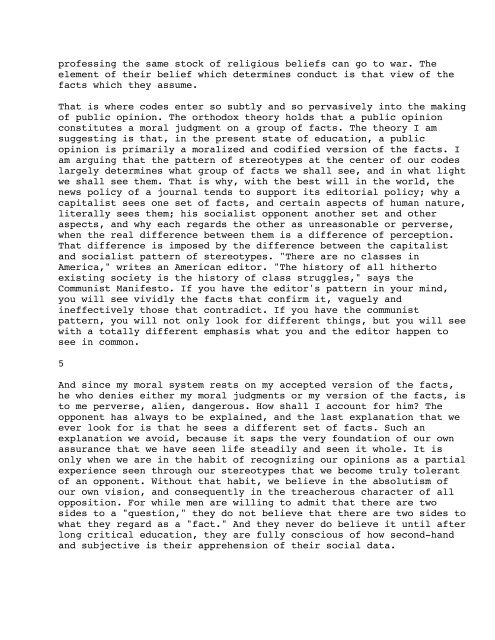PUBLIC OPINION by WALTER LIPPMANN TO FAYE LIPPMANN ...
PUBLIC OPINION by WALTER LIPPMANN TO FAYE LIPPMANN ...
PUBLIC OPINION by WALTER LIPPMANN TO FAYE LIPPMANN ...
Create successful ePaper yourself
Turn your PDF publications into a flip-book with our unique Google optimized e-Paper software.
professing the same stock of religious beliefs can go to war. The<br />
element of their belief which determines conduct is that view of the<br />
facts which they assume.<br />
That is where codes enter so subtly and so pervasively into the making<br />
of public opinion. The orthodox theory holds that a public opinion<br />
constitutes a moral judgment on a group of facts. The theory I am<br />
suggesting is that, in the present state of education, a public<br />
opinion is primarily a moralized and codified version of the facts. I<br />
am arguing that the pattern of stereotypes at the center of our codes<br />
largely determines what group of facts we shall see, and in what light<br />
we shall see them. That is why, with the best will in the world, the<br />
news policy of a journal tends to support its editorial policy; why a<br />
capitalist sees one set of facts, and certain aspects of human nature,<br />
literally sees them; his socialist opponent another set and other<br />
aspects, and why each regards the other as unreasonable or perverse,<br />
when the real difference between them is a difference of perception.<br />
That difference is imposed <strong>by</strong> the difference between the capitalist<br />
and socialist pattern of stereotypes. "There are no classes in<br />
America," writes an American editor. "The history of all hitherto<br />
existing society is the history of class struggles," says the<br />
Communist Manifesto. If you have the editor's pattern in your mind,<br />
you will see vividly the facts that confirm it, vaguely and<br />
ineffectively those that contradict. If you have the communist<br />
pattern, you will not only look for different things, but you will see<br />
with a totally different emphasis what you and the editor happen to<br />
see in common.<br />
5<br />
And since my moral system rests on my accepted version of the facts,<br />
he who denies either my moral judgments or my version of the facts, is<br />
to me perverse, alien, dangerous. How shall I account for him? The<br />
opponent has always to be explained, and the last explanation that we<br />
ever look for is that he sees a different set of facts. Such an<br />
explanation we avoid, because it saps the very foundation of our own<br />
assurance that we have seen life steadily and seen it whole. It is<br />
only when we are in the habit of recognizing our opinions as a partial<br />
experience seen through our stereotypes that we become truly tolerant<br />
of an opponent. Without that habit, we believe in the absolutism of<br />
our own vision, and consequently in the treacherous character of all<br />
opposition. For while men are willing to admit that there are two<br />
sides to a "question," they do not believe that there are two sides to<br />
what they regard as a "fact." And they never do believe it until after<br />
long critical education, they are fully conscious of how second-hand<br />
and subjective is their apprehension of their social data.





